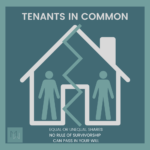Joint Tenants or Tenants in Common? One of the most common questions we are asked. And the one where there are most myths and misunderstandings! So, what does it all mean?
When you buy a house with someone else, you are often asked by your conveyancer if you want to hold that ownership as Joint Tenants or Tenants in Common. And given a fact sheet with lots of blurb. We see so many people that don’t remember how they own their home, and don’t really understand the differences or the protections each type of ownership can give. So here is a (hopefully!) simple overview for you.
As Joint Tenants (sometimes called ‘beneficial joint tenants’):
- you have equal rights to the whole property
- the property automatically goes to the other owners if you die
- you cannot pass on your ownership of the property in your Will
As Tenants in Common
- you can own different shares of the property
- the property does not automatically go to the other owners if you die
- you can pass on your share of the property in your Will
How do I know how we own the property?
If you don’t know, or can’t remember, don’t worry! Most people don’t! It is easy to find out by checking the Land Registry Title Deed. We do this for you before we meet to talk about your Will, so we can discuss your own individual circumstances with you.
So what’s better – Joint Tenants or Tenants in Common?
Well, it really depends on your circumstances! No one answer fits all situations. But here are some scenarios:
Many couples decide to buy as Joint Tenants. It means each of the owners has an equal share.
- If the couple splits, then the proceeds are distributed 50:50, regardless of who contributed what to the deposit, mortgage or running costs.
- If one owner dies, the other automatically inherits the whole property under the rule of survivorship. For unmarried couples (who don’t have any automatic rights on death) it gives the comfort that if one of them dies, the other automatically inherits the whole property. But for some other types of co-owners (e.g. siblings, or couples with children from previous relationships) that could be a disaster as they would want their share to go to their own children. And regardless of what your Will says … it won’t!
Imagine Gill and Kevin buy a house together for them and their children as joint tenants. When Gill dies, her share goes directly to Kevin. If he later marries, then dies, both shares of the house will pass via his Will. That could mean that his new wife, and not his children with Gill, inherits the family home.
But this type of ownership could be an advantage for Sally and Owen who are unmarried. When Owen dies suddenly without a Will, Sally wouldn’t have any rights to Owen’s share of the home. But owning as Joint Tenants would mean she would inherit the house automatically under the rule of survivorship.
For couples who buy as Tenants in Common, you can have equal or unequal* shares.
- If the couple splits, then the proceeds are distributed according to their share. So it could be 70:30 or any other agreed share.
- If one owner dies, there is no rule of survivorship. Their share passes via their Will (or the rules of Intestacy if they didn’t have a Will).
Using the examples above, for Gill this means she could leave her share to her children in a trust in her Will. That would guarantee the children have at least her share of the home even if their father’s share went to his new wife.
For Sally and Owen, who are unmarried, this could work well if they had unequal shares, but Owen’s share would go to his family if he died without a Will. And Sally could be under pressure to sell so that Owen’s family could get their inheritance. If he’d made a Will, he could have given Sally the right to live in the house for a specified period of time to protect her.
*If the shares are unequal, we would strongly recommend this is documented in a legal “Declaration of Trust” that may lay out how each contributed to the deposit, or mortgage etc, and what happens when the property is sold.
Which option is right for me?
Choosing joint tenants or tenants in common is entirely up to you.
If you are buying a property with your partner, then buying as joint tenants might seem like a natural fit. After all, you might be contributing equal shares, and you might be happy for the property to be passed into your partner’s sole name, should you die first.
However, if you are making unequal contributions, then buying as tenants in common could be a better option. And that may also be the best option if you want to leave your share of the property to your choice of beneficiary. Or protect your share from accidentally being lost for your family.
In summary, owning your home as Tenants in Common can be really useful. Especially if you own unequal shares or if you are in a second relationship. But you MUST back it up with a Will, stating clearly what happens to your share!
Where can I find out more about Property Trust Wills?
Protecting your share of your property in a Property Trust Will is very common and very popular with couples of any age. You can find out more:
- In Nicola’s YouTube video here.
- In our simple guide here
- In Andrea’s recent blog here.
And remember … even if you have chosen Joint Tenants previously, this can still be changed to Tenants in Common. That’s important if you want to leave your share in your Will. We can do that for you!
If you’d like to learn, more call us on 01524 571032. We offer a free 30 minute consultation for you to ask questions and decide if you’d like Morecambe Bay Wills to help you protect your home and family.




